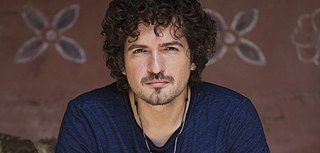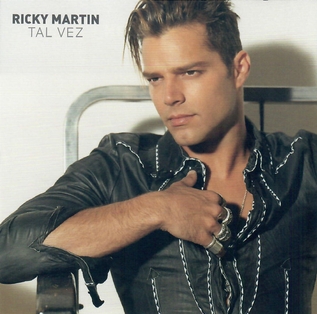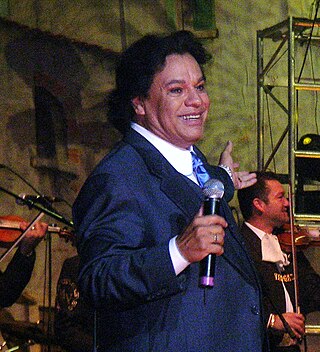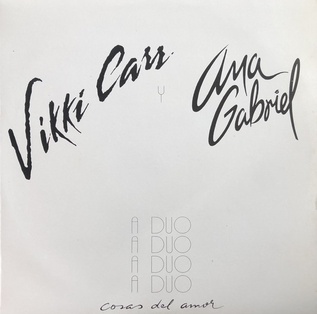Related Research Articles

Almas del Silencio is the seventh studio album and fifth Spanish language album recorded by Puerto Rican performer Ricky Martin. This is the first Spanish album release since 1998's Vuelve. It was released by Sony Discos and Columbia Records on May 20, 2003. The album was released in 38 non-Hispanic countries and reached top ten in Spain, Switzerland, Italy, Portugal, Norway and Finland.

Franco Atilio De Vita De Vito is a Venezuelan Latin Grammy award-winning singer-songwriter. His first album as a solo artist garnered three Spanish-language hits in Venezuela. He signed with the CBS Records label in 1989, and in 1990, his album Extranjero had a song that reached No. 1 on the United States Latin charts and won an MTV Video Music Award. His 2004 album Stop reached the Top 10 throughout Latin America and on the United States Latin charts. In the United States alone, he has scored more than two dozen hits on the Billboard charts.

Luis Alfonso Rodríguez López-Cepero, known by his stage name Luis Fonsi, is a Puerto Rican singer. He is known for multiple songs, one of them being "Despacito" featuring rapper Daddy Yankee.

Tomás Torres Carrasquillo, known professionally as Tommy Torres, is a Puerto Rican singer, songwriter, and record producer. Named "#1 Hot Latin Tracks Producer" of 2007 by Billboard magazine and Composer of the Year at 2010 ASCAP's Latin Music Awards, Torres has written and produced songs for many artists including Ricardo Arjona, Jaci Velasquez, Ednita Nazario, Alejandro Sanz, Ricky Martin and Franco De Vita.

Cualquier Día is Latin Grammy winning album and debut Spanish album of Puerto Rican singer-songwriter Kany García. It reached the top 10 of the Latin Pop album charts in the United States, top 50 in Mexico and #1 in Puerto Rico. The album was released on September 17, 2008 and produced by Sony BMG. It was released to critical acclaim.

"Tal Vez" (transl. "Perhaps") is a song recorded by Puerto Rican singer Ricky Martin for his seventh studio album, Almas del Silencio (2003). The song was written by Venezuelan singer-songwriter Franco De Vita, while the production was handled by Tommy Torres. It was released to radio stations by Sony Discos as the lead single from the album on March 25, 2003. A Spanish language rock ballad, it is a romantic song about regret, lost opportunities, and last chances. The song received widely positive reviews from music critics, who complimented its melody, lyrics, and Martin's vocals. It was ranked as one of the Top Latin Songs of the Century by Latin Times.

The year-end charts for the Hot Latin Songs chart are published in the last issue of Billboard magazine every year. Initially, the chart was based on information provided by Nielsen Broadcast Data Systems, which collected airplay information from Latin radio stations in the United States. On the week ending October 20, 2012, the methodology was changed to track the best-performing Spanish-language songs based on digital downloads, streaming activity, and airplay from all radio stations in the country. The Year-End charts represent aggregated numbers from the weekly charts that were compiled for each artist, song and record company.

"¡Basta Ya!" is a song by Puerto Rican singer Olga Tañón from her fourth studio album, Nuevos Senderos (1996). The song was written and produced by Marco Antonio Solís. It was released as the lead single from the album in 1996. "A ballad, the song is about unrequited love and marked a musical departure from Tañón's merengue recordings. The song was nominated for Pop Song of the Year at the 1997 Lo Nuestro Awards. Commercially, it topped both the Billboard Hot Latin Songs and Latin Pop Airplay charts in the United States. A music video for the song was filmed and features a couple's failing relationship.

"Sopa de Caracol" is a song performed by the Honduran punta rock band Banda Blanca. It was originally written by Belizean singer Hernan "Chico" Ramos and translated to Spanish by Banda Blanca. The song was released by Sonotone Music in 1991 and achieved international success, peaking at number one on the Billboard Top Latin Songs in the United States. The track included elements of Garifuna music and punta, and has been used as a promotion for the Ladino region of Honduras.

"Vuelve" is a song recorded by Puerto Rican singer Ricky Martin for his fourth studio album, Vuelve (1998). The song was written by Franco De Vita, while the production was handled by K. C. Porter and Draco Rosa. It was released to radio stations by Sony Discos as the lead single from the album on January 26, 1998. A Spanish language power ballad and Latin pop song with elements of rock and gospel, it is about the singer's true love, who gives the meaning of his life. It received generally positive reviews from music critics, who complimented its romantic lyrics and Martin's vocal.
"Mi Deseo" is a song by Mexican Grupero band Los Bukis. It was written and produced by the band’s main songwriter and lead vocalist Marco Antonio Solís and was released by Fonovisa Records on February 11, 1991, as the lead single from the band’s 13rd studio album A Través de Tus Ojos (1991). The song became their third number-one single in the Billboard Top Latin Songs chart, after "Y Ahora Te Vas" and "Cómo Fui a Enamorarme de Ti".
"Todo, Todo, Todo" is a song written by Jorsaci, produced by Bebu Silvetti, and performed by Mexican singer-songwriter and actress Daniela Romo. It was released by EMI Latin in 1991 as the second single from Romo's sixth studio album Amada más que nunca (1991). The song became the second number-one single for Romo in the Billboard Top Latin Songs chart, after "De Mí Enamórate" five years prior. Romo earned two nominations at the Lo Nuestro Award in 1992 for the track, Pop Song of the Year and Best Music Video, winning the latter. "Todo, Todo, Todo" has a choreography which is a staple at Filipino informal/formal (hall) parties. The video received a Billboard Music nomination for Latin Video of the Year by a Female Artist.

"Taboo" is the second single from Don Omar's collaborative album Meet the Orphans released on January 24, 2011 through Universal Latino. The song is re-adapted version from Los Kjarkas's song "Llorando se fue" most commonly known for its use in Kaoma's 1989 hit single "Lambada" fused with Latin beats. The song peaked at number one on the Billboard Latin Songs, becoming his third number one single on the chart.

"Por Debajo de la Mesa" is a song written by Armando Manzanero and performed by Mexican recording artist Luis Miguel. Arranged by Bebu Silvetti, it was one of the two original compositions written for Miguel's fifteenth studio album Romances. It was released as the lead single from the album on 15 July 1997 and it became his thirteenth number-one single on the Billboard Hot Latin Songs chart in the United States. The music video features Miguel performing at a fine-dining restaurant in New York City.

En Primera Fila is the third live album by Venezuelan recording artist Franco De Vita. It was released by Sony Music on May 31, 2011, after a three-year gap since the release of De Vita's last studio album. De Vita worked as producer with David Cabrera. The album is part of the live albums series entitled Primera Fila, promoted by the record label and including De Vita's greatest hits on re-worked versions and new songs.

"Tan Sólo Tú" is a Latin pop song by Venezuelan recording artist Franco De Vita from his third live album En Primera Fila (2011). Produced by David Cabrera and De Vita, the track was released as the album's first single in Latin America and the United States and it is performed as a duet with Mexican singer Alejandra Guzmán.

20 Años de Éxitos En Vivo con Moderatto is the third live album by Mexican recording artist Alejandra Guzmán. It was released by EMI Latin on June 21, 2011, and features the participation of Moderatto as her backing band. Jay de la Cueva worked as producer of the album, which was recorded at the Palacio de los Deportes in Mexico City on March 17, 2011. The album includes Guzmán's greatest hits, a song originally performed by Moderatto, and two newly recorded songs, including the theme song of the Mexican telenovela Una familia con suerte.

"Cosas del Amor" is a song by American recording artist Vikki Carr and Mexican singer-songwriter Ana Gabriel. It was released as the lead single from Carr's studio album Cosas del Amor (1991). Written by Roberto Livi and Rudy Pérez, the song portrays the relationship between two friends and confidences between both due to marital problems of one of them.

"Amor" is a song written and performed by Mexican singer Cristian Castro and produced by Daniel Freiberg. It was released as the lead single for Castro's fourth studio album El Deseo de Oír Tu Voz in 1995 by Melody Records. It is an acoustic pop rock song in which the singer asks love to give him a chance. In the United States, it reached the summit of the Billboard Hot Latin Songs and spent 11 weeks at this position. In 1996, it ended as the second-best performing Latin song of the year in the country. "Amor" also reached number one on the Latin Pop Songs compiled by the same publication. A music video for "Amor" was filmed in Rome, Italy and directed by Castro, featuring the artist performing various stunts in the city.

Joyas Prestadas: Pop and Joyas Prestadas: Banda are the 12th and final studio albums by recording artist Jenni Rivera, released on November 21, 2011 by Fonovisa Records. Joyas Prestadas consists of a double album with eleven cover songs, each recorded with two distinct styles of music. The first half being recorded in pop, while the second was recorded in the Regional Mexican subgenre of banda. The album was produced by Enrique Martinez. According to Rivera, the songs she chose to cover were those she was enamored with while working as a cashier in a record store.
References
- ↑ Kellner, Elena (May 2, 1991). "PEOPLE IN ENTERTAINMENT: [Nuestro Tiempo Edition] - ProQuest". Los Angeles Times. ProQuest 281492927 . Retrieved February 10, 2023.
- ↑ "Franco De Vita va al Festival de Viña" (in Spanish). Chile.com. Retrieved January 18, 2011.
- ↑ "L.L., C&C, Brooks, Gipsy Kings Top in Awards" (PDF). Billboard: 37. November 23, 1991.
- ↑ "No Basta — Week of February 9, 1991". Billboard. February 9, 1991. Retrieved January 17, 2011.
- ↑ "No Basta — Week of March 2, 1991". Billboard. March 2, 1991. Retrieved January 17, 2011.
- ↑ "No Basta — Week of March 30, 1991". Billboard. March 30, 1991. Retrieved January 17, 2011.
- ↑ "Mi Deseo — Week of May 11, 1991". Billboard. May 11, 1991. Retrieved January 17, 2011.
- ↑ "Topping The Charts Year By Year". Billboard. Vol. 110, no. 48. Nielsen Business Media, Inc. November 28, 1998. p. LMQ3. Retrieved January 15, 2011.